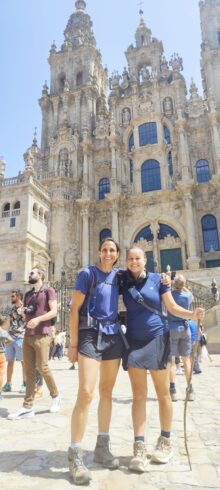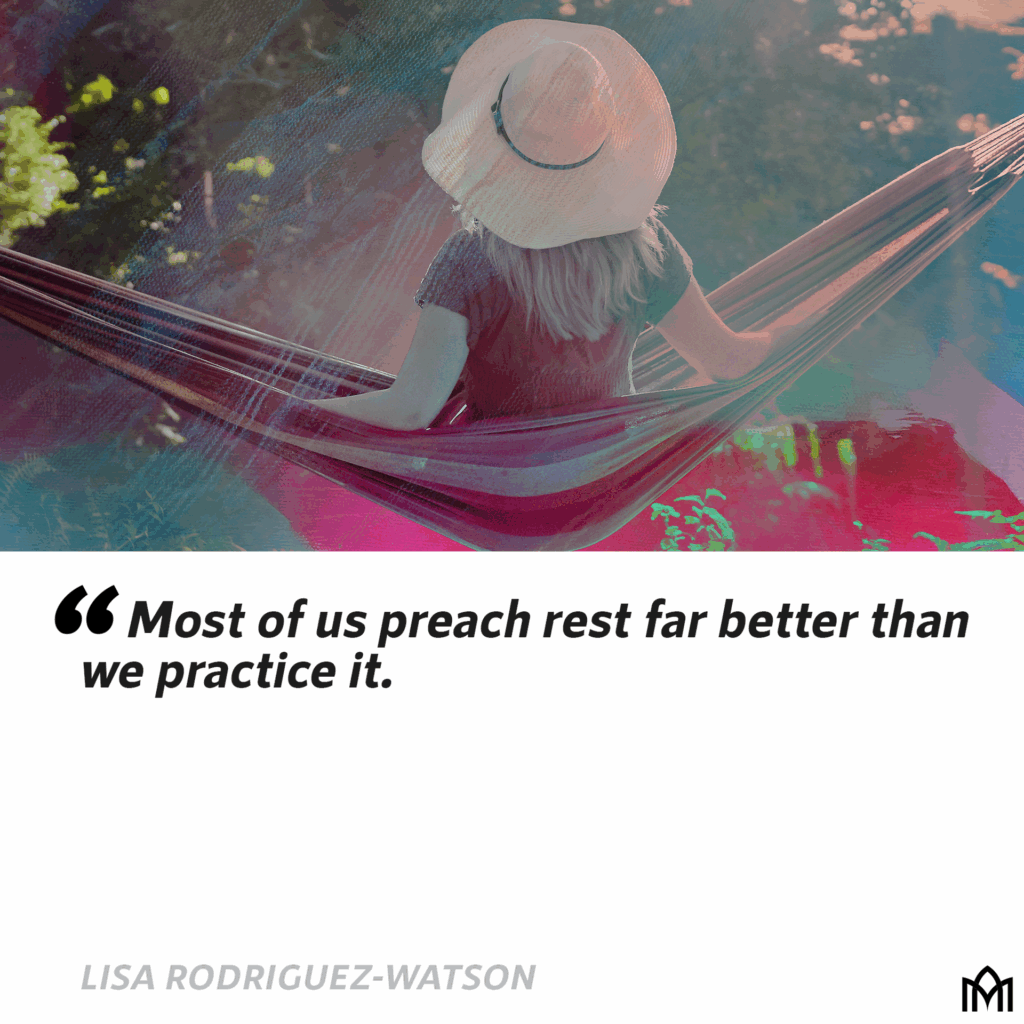When Are You Going to Rest?
Lessons in Work, Worth, and Sabbath
A few weeks ago, my daughter Annelies and I walked part of the Camino de Santiago in Spain. My husband and I have created rite of passage trips for our kids in their early teenage years. This trip was Annelies’ rite of passage. Like any good achiever, I had a plan: fly to Spain, walk the 70 miles required to qualify for the Compostela certificate, make this trip memorable for Annelies, then get back home in time for the next thing on my calendar.
Efficiency. Accomplishment. Check the box.
Before we left, I was staying with my longtime mentor and friend, Deb Hirsch. I enthusiastically laid out the plan: “We can fly out Monday, land Tuesday, walk from Wednesday through Monday, and fly home Tuesday. Six days. Seventy miles. Done.”
She looked me in the eye, paused, and asked in her beautiful Australian accent: “When are you going to rest?”
I laughed and said what came naturally: “Uhhh. That’s not a thing.”
Deb and her husband, Al, smiled kindly and pushed a little further: “Lisa, what would it look like to slow down? To let this experience shape you, instead of you trying to conquer it? You have to make room for rest.”
They were right. I adjusted our plan. We added a day, and along the Camino took additional rest days. And that extra space to pause—not just pushing for the certificate—ended up being far more life-giving than the achievement I was chasing.

Arrival with my daughter Annelies at the Cathedral of Santiago de Compostela in Galicia, Spain, the end of the Camino Santiago and the traditional site of the tomb of James the apostle. ~LRW
That moment on the Camino felt like a parable for ministry leadership. How often do we, as pastors and Christian leaders, map our lives around outcomes, certificates, checklists, growth charts, and goals—while neglecting the space to be reshaped by God in the journey?
Rest is Hard for Leaders
If it was hard for me to recognize the need for rest on the Camino, it’s even harder in ministry. Most of us preach rest far better than we practice it.
The data is sobering. Pastoral burnout is at historic highs. Leaders are leaving ministry at alarming rates. Polarization and cultural upheaval only intensify the pressure. And all of it happens in systems that reward overwork and shame slowing down.
A few weeks ago, my friend Pastor Rich Villodas published a piece on his Substack that challenged me deeply. Here’s an excerpt:
“When productivity is your god, rest feels like disobedience. It feels like betrayal; idolatry even. What’s needed is a recalibration—or rather a re-imagination—of what it means to be human and in relationship with God. We were created to live in harmony within a rhythm of rest and work. Our lives can’t be understood apart from this interplay. To rest is to acknowledge my limits. To work is to acknowledge my potential. To rest is to entrust our world to the care of God. To work is to be reminded that God entrusts us with the care of the world. All of this speaks not just to rest in a generic way, but in a Sabbath way.” (Rich Villodas, “The Resistance We All Need“)
If Rich is right—and I believe he is—then one of the greatest challenges before the church today is to cultivate leaders who live this rhythm themselves.
A Biblical Vision
From the beginning, Scripture affirms that work is good. Genesis tells us that before sin entered the story, God placed humanity in the garden “to work it and take care of it” (Genesis 2:15) Work is part of bearing God’s image.
But work was never meant to define our worth. Paul, writing in Colossians, reframes work not as striving for approval but as worship: “Whatever you do, work at it with all your heart, as working for the Lord, not for human masters” (Colossians 3:23).
And Exodus grounds work and rest in God’s own rhythm: “Remember the Sabbath day and keep it holy” (Exodus 20:8). In Egypt, God’s people were valued only for the bricks they produced.
Sabbath was God’s declaration of freedom: “You are not slaves anymore. You don’t have to prove your worth through bricks, or busyness, or production. You are mine. You are free.”
Sabbath is both resistance and delight. It resists Pharaoh-like systems that measure our worth by output. And it delights in God’s goodness: meals, laughter, play, joy. Sabbath is not just about stopping; it’s about receiving.
Most of us preach rest far better than we practice it. Share on X
My Own Fumbling Forward
I need to admit: I am not naturally good at this. I’m an achiever, dependable, raised to work hard and give my all. For someone like me, Paul’s words in Colossians—“work at it with all your heart, as working for the Lord”—can get twisted into fuel for overwork: Do more. Try harder. Give everything.
And yet Jesus also says in Matthew 11: “Come to me, all you who are weary and burdened, and I will give you rest… for my yoke is easy and my burden is light” (Matthew 11:28-30).
Rest, in Jesus’ economy, is not disobedience. It is the very heart of obedience.
I confess I’m still fumbling my way forward. But maybe that’s precisely the point: I’m not sharing from a place of mastery, but from the middle of the journey, right where most of us are.
Study Leave as a Practice of Trust
This fall, from September to December, I will be taking a study leave. I’ll be leveraging this time to reflect, realign, and reimagine—discerning strategic priorities and sustainable models that deepen Missio Alliance’s mission amid shifting cultural and ecclesial landscapes. A little more specifically, here’s what that looks like:
- Reflect: I need space to slow down, to listen to God, to engage in practices that re-center me in Belovedness. For the first month, I’ll fully disconnect from work and focus on listening and reflection. Leaders can only give what they have received, and effective leadership is rooted not in output, but in abiding. As someone who has led through various seasons, I know the toll that constant production takes. This month will serve as a reorientation away from urgency and into deeper spiritual listening.
- Reimagine: I want to dream with you, so the middle months will center on listening—listening to voices within Missio Alliance and to the wider church. My focus will be on surfacing shared questions, pressing needs, and emerging opportunities that can guide us into a more fruitful expression of our mission. I will also spend time learning from catalytic organizations that, like Missio Alliance, are navigating growth and cultural change through both digital and in-person presence. In doing so, I hope to gather wisdom about sustainable models that hold together both values and viability.
- Realign: In December I will begin the gentle work of re-entry—sharing insights with my team, inviting feedback, and discerning together what alignment, sustainability, and strategic focus might look like for us in the season ahead. This will not be a rush back to activity but a collaborative process of translating reflection and imagination into faithful next steps.
This time away is a privilege. It’s also an act of responsibility—because if we as leaders don’t embody the rhythms of rest and reflection we preach, the communities we serve will inherit our exhaustion.
Sabbath is both resistance and delight. It resists Pharaoh-like systems that measure our worth by output. And it delights in God’s goodness: meals, laughter, play, joy. Sabbath is not just about stopping; it’s about receiving. Share on X
Returning to the Camino
I keep coming back to that moment with Deb about the Camino when she asked me, “When are you going to rest?” My instinct was to push, to conquer, to earn. But the gift came in the pause—in the day we didn’t plan, in the space to let the journey shape us instead of us trying to control it.
Isn’t that what leadership so desperately needs? Space for rest, recalibration, and vision.
The temptation will always be to keep marching toward the certificate, toward the next goal, the next measurable outcome. But the Spirit whispers another invitation: to stop, to delight, to trust that God holds the world even when we don’t.
So I wonder: where might God be asking you, too, “When are you going to rest?”
Because the truth is, Sabbath is not something we push off until retirement or until the work is finally finished. Sabbath is what makes us human. It’s what roots us in the love of Christ. It’s what keeps us free.
Leaders, our people need us to model this—not as experts, but as fellow travelers. Not as those who have mastered rest, but as those willing to be reshaped by it.
As I step into study leave this fall, my prayer is not only that I’ll return with clarity for Missio Alliance’s mission, but also that my life will testify to this truth: We don’t work for approval. We work from Belovedness.
May we all, together, learn to stop chasing certificates long enough to hear God’s invitation: “Come to me, and I will give you rest.”
///
Leaders can only give what they have received, and effective leadership is rooted not in output, but in abiding. We don’t work for approval. We work from Belovedness. Share on X




